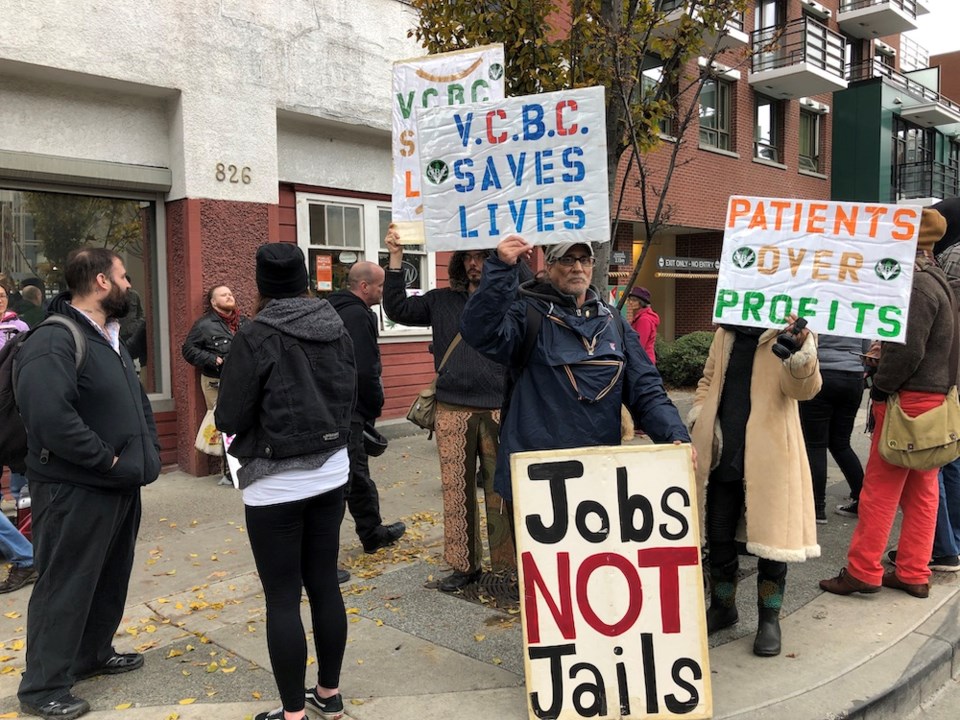Members of Victoria Cannabis Buyers Club, a non-profit dispensary that sells cannabis products to those with chronic pain, gathered outside the storefront Thursday as investigators conducted a raid inside.
The provincial Community Safety Unit, responsible for enforcing cannabis regulations, arrived at the unsigned Johnson Street storefront about 10:45 a.m. to seize illegal cannabis products. Victoria police officers were at the scene to assist.
Unlike recreational dispensaries, the club requires prospective members to provide proof of a chronic condition with a doctor’s signature. Operating since 1996, it serves more than 7,700 clients.
Nikki Jackson, the club’s communications officer, has been a member since 2012. Diagnosed with Crohn’s disease at 17, Jackson was on 15 pharmaceutical medications that she said induced a manic episode before she made the switch to cannabis.
“I would not be here today if it wasn’t for that. I couldn’t leave my bed. I was hardly working. I was on my death bed,” Jackson said. “Which is why this is so detrimental, because I literally wouldn’t be here if it weren’t for the products they’re going to seize.”
The unlicensed dispensary sells a large variety of cannabis products, many of which are illegal, despite the legalization of cannabis more than a year ago.
Jackson said the club makes its own cookies, topicals, sleep aids and oils that contain higher doses than are allowed under the Cannabis Control and Licensing Act, and use parts of the cannabis plant that are prohibited.
Jackson consumes between 400 and 2,000 milligrams of THC daily through the club’s homemade capsules and edibles, which she said would be nearly impossible to consume through legal products, which are limited to 10 milligrams per package.
“With my digestive issues, I literally can’t eat that much food to get that much medicine. It’s not physically possible,” she said. Smoking cannabis doesn’t work for Jackson’s symptoms, she said.
While the province is responsible for regulating the sales of non-medical cannabis, the federal government regulates access to medical cannabis and does not permit storefront sales. To access medical cannabis products legally, users can have cannabis sent directly from a Health Canada licensed producer, register to grow a small amount for their own purposes or designate someone to grow on their behalf.
For Paul Aussenegg, who has been a member for four years, the club is more than a dispensary —for him, it’s a community where people care about his well-being.
“They help people realize that they exist,” he said. “They actually care. It’s that extra level of care that this place has that any other dispensary doesn’t have.”
Aussenegg said club staff are knowledgeable about how to use cannabis as medical treatment, adding the government products don’t stack up.
His story is similar to Jackson’s. He said pharmaceutical medications didn’t give him relief from ADHD, colitis and hypochondria, so he turned to cannabis.
Jacq, a club volunteer who declined to give her last name, said that in order to operate legally, the club would need to shut down while waiting for a licence, which comes with a $7,500 application fee in B.C.
“If we were to comply, we would leave our patients for, I don’t know, 18 months — that’s the average, or more — with nothing. If we did open, we would only be able to provide a slim margin of the products we actually provide.”
She said club members have been anticipating the raid for months, as they watched the province crack down on unlicensed dispensaries in the city.
The Community Safety Unit has visited about 200 unlicensed cannabis retailers across the province to inform them of the consequences of violating cannabis regulations, hoping to encourage voluntary compliance. The province has a year to determine a fine for violators, based on the amount of product seized.
The Ministry of Public Safety and Solicitor General, which oversees the Community Safety Unit, confirmed officers were at multiple locations in Victoria during the week. As more licenses are issued, enforcement actions are expected to increase.
Closures of other dispensaries have resulted in five to 10 new members joining the club every day, said Jackson.
Club members are planning a rally at the legislature at noon today in response to the raid, and say they plan to reopen the club.



